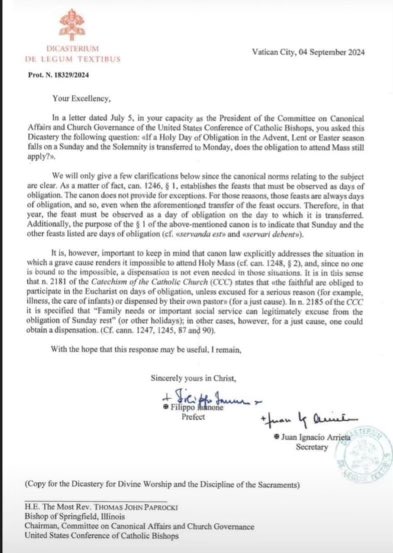(ZENIT News / Washington, 10.19.2024).- A recent clarification from the Vatican’s Dicastery for Legislative Texts has sparked discussions around the U.S. bishops’ policy regarding holy days of obligation. The legal interpretation, issued in response to a query from Bishop Thomas Paprocki of Springfield, Illinois, brings new scrutiny to how certain holy days are observed when their celebrations are moved from Sunday to another day.
The Vatican’s letter, dated September 4, was made public in late September and addresses the obligation of Catholics to attend Mass when a solemnity is transferred from its original Sunday date to the preceding Saturday or following Monday. The U.S. Conference of Catholic Bishops (USCCB) has had a long-standing policy, in effect since 1992, stating that when some holy days are transferred, the requirement to attend Mass is lifted.
A Conflict of Interpretations
The heart of the issue revolves around whether the obligation to attend Mass remains when a holy day, such as the Immaculate Conception or other solemnities, is moved. Bishop Paprocki, in his role as chair of the USCCB’s Committee on Canonical Affairs, sought clarification from the Vatican: «If a holy day of obligation in Advent, Lent, or Easter is transferred to a Monday, is the obligation still binding?» The response from the Vatican’s Prefect for Legislative Texts, Archbishop Filippo Iannone, made it clear: the obligation remains.
Archbishop Iannone stated that Canon Law explicitly lists the solemnities that must be observed as holy days of obligation. These include the Nativity of the Lord, Epiphany, Ascension, Corpus Christi, and other major feasts. “The canon does not allow for exceptions,” he wrote. Thus, even if the celebration is moved, the obligation stands.
However, the Vatican letter also recognized the principle of «moral impossibility,» which means that if attending Mass is genuinely impossible for a person, no dispensation is necessary. This would typically apply to serious situations, but minor inconveniences such as back-to-back Masses or workday obligations do not qualify as sufficient cause for missing Mass.
USCCB’s 1992 Policy Under Scrutiny
While the Vatican’s stance is clear, questions remain about how it aligns with U.S. policy. The USCCB has the authority to adapt the universal laws of the Church for particular circumstances in the United States. Since 1992, their norms state that when certain holy days fall on a Saturday or Monday, the obligation to attend Mass is removed. However, the recent clarification from the Vatican seems to call this approach into question.
A notable example this year involves the Feast of the Immaculate Conception, the national patronal feast of the United States, which typically falls on December 8. In 2024, this feast is transferred to Monday, December 9, as December 8 falls on the second Sunday of Advent. According to the Vatican’s recent interpretation, the obligation to attend Mass on December 9 should still stand, but the USCCB’s liturgical calendar for 2024 marks the day as “not a holy day of obligation.”
Potential Oversights and Internal Disagreement
The discrepancy has raised questions about whether an error was made in the USCCB’s 2024 liturgical calendar. Some speculate that the omission of the Immaculate Conception from the holy days of obligation this year may have been unintentional, as the 1992 norms do not explicitly cover this particular situation.
According to sources close to the USCCB, there may have been internal disagreement between the Committee on Canonical Affairs, led by Bishop Paprocki, and the Committee on Divine Worship, chaired by Bishop Steven Lopes. It’s suggested that Bishop Lopes’ committee believed the holy day obligation for the Immaculate Conception would be automatically dispensed by universal law since the feast was moved to Monday. This interpretation was challenged by Bishop Paprocki, leading to his request for a formal ruling from the Vatican.
Looking Ahead: A Potential Policy Revisit
The Vatican’s clarification seems to suggest that, despite the USCCB’s past policies, U.S. Catholics are still bound to observe the Immaculate Conception as a holy day of obligation this year, even though it has been moved to December 9. This situation may prompt the U.S. bishops to revisit their 1992 guidelines to ensure alignment with the universal law of the Church.
For now, many U.S. Catholics might find themselves navigating conflicting messages—whether to follow the guidance of the national bishops’ calendar or adhere to the Vatican’s stricter interpretation of Canon Law. Either way, the recent ruling highlights the complexity of Church law and the careful balance between national adaptations and the universal Church’s expectations. As the U.S. bishops convene in upcoming meetings, this issue is likely to be a topic of significant discussion, potentially leading to revised policies that align more closely with Rome’s directives.
Thank you for reading our content. If you would like to receive ZENIT’s daily e-mail news, you can subscribe for free through this link.




